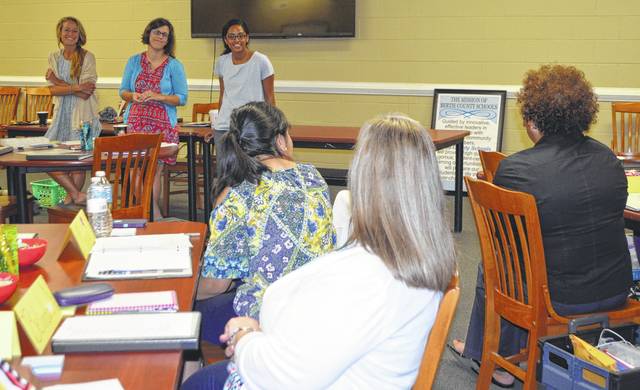A group of elementary teachers are looking forward to making students become better readers through a successful institute.
Three educators from Sampson County Schools (SCS) recently participated in the Targeted Reading Intervention (TRI) Certification Institute, hosted by Bertie County Schools. The SCS participants were Monica Williams, Hargrove Elementary; Katherine Powell, Union Elementary school; and Leslie Lee, Hobbton Elementary School.
TRI was developed by Lynne Vernon-Feagons, Marnie Ginsberg and Steve Amendum. The decade old program was developed to help elementary students gain additional reading instruction with assistance from their teachers. Kindergarten through second-grade teachers met last year at the Central Services Complex of Bertie County with instructors/coaches from the University of North Carolina at Chapel Hill.
As a kindergarten teacher, Williams said she loves being a part of the program. One of benefits is working one-on-one with students with decoding words and reading.
“However, as teachers we are creative and modified our TRI lessons to make it work for individual, small, and whole group lessons,” Williams said. “I have seen so much improvement in my students academically while fostering a wonderful relationship among my students one-on-one.”
Williams said there’s not much time to just to sit and talk with all students personally. The program gives them space to do so.
“So with this program, they felt more special that they had my attention for 30 minutes everyday while we worked on reading interventions,” Williams said. “It was our special time.”
She’s thankful for Hargrove Elementary Principal Edward Homes for incorporating the program in the school because it helped with different types of learners. Williams added that TRI researchers provided data, tips and feedback to help students.
“Overall, it’s pure enjoyment for me to see my students smile and feel proud of themselves as they realize they are learning how to read. So I will use this program again.” Williams said.
During the two-day training, the teachers expressed their successes and went over methods to help students become active listeners and confident readers They also received a white board, letter-sound tiles, reference tools and four bins of books for different reading levels.
For Powell, the key component was being assigned a literacy coach. She was concerned about having a difficult task of finding time during the day to have a one-on-one lesson. But after rearranging her schedule several times, it worked out for the coach and Powell. At Union Elementary, one English Language Learner was selected and worked with educators for several weeks. Once a week, Powell would FaceTime her TRI coach from UNC-Chapel Hill as she worked on lessons. Some of them involved fluency, words, oral reading and writing.
During the year, Powell was able to work with three students who moved up about five to six levels on a reading assessment.
“The TRI has not only helped me with my three target students, but I have also been able to implement it in my classroom during whole group and small group time,” Powell said. “It has helped me to develop diagnostic skills to target students’ most pressing needs helping to quickly accelerate the children’s reading progress. It is a very effective program that I will be able to use for years to come.”
The gathering was held in late June and participants were part of the beginning of the grant-funded TRI. According to a news release from Bertie County Schools, funding and TRI is associated with NC QUEST (North Carolina Quality Educators through Staff Development and Training).
The Sampson teachers are working on receiving their TRI Certification. This requires teachers to record videos demonstrating proficiency at each level. After each recording, coached will review and give feedback. Powell said they’re also required to engage in leadership activities such as TRI meetings for a grade level or helping at the training institute.
Lee is looking forward to helping students through the TRI program in the future. She believes it’s a great way to reach struggling readers by focusing more on recognizing sound patterns, instead of letter recognition.
“I’ve seen tremendous growth this past school year in the students that received the benefits of this program during the trial period,” Lee said. “I am excited to have this program to add to my teacher tool box of strategies to use with all of my future students.”

